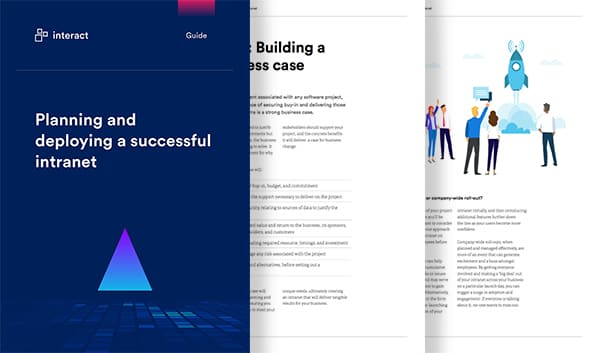Why do your best employees quit? 5 guaranteed ways to reduce employee turnover
They are your hardest workers. Your go-getters. The rockstars that keep your company success rolling. So…why are they leaving? Employee turnover is more hazardous than you may think.
Finances are up, customer satisfaction is through the roof, and you couldn’t be happier…but your employees can. Losing an employee is hard for any company. But the disappointment is 10x worse when it’s one of your best.
Bringing someone new into the fold is expensive, and all that money and time dedicated to onboarding and training goes down the drain when you let your best employees slip out of your grasp. Employee turnover is measured to cost US companies $160 billion a year.
Searching for good talent is no easy task and snatching them away from any potential competitors is even harder. Now that you’ve caught them, don’t let your bad behavior drive your employees away.
Here are five reasons your best employees are bolting and some ways to fix it.
They feel unappreciated
A great company supports and encourages their best talent, understanding that it’s their expertise and skill that makes it all run smoothly.
But unfortunately, not all companies recognize how important this is. According to BambooHR, 66% of employees say that they would work harder if they felt their efforts were better appreciated. And yet, 82% of employees don’t think they’re recognized for their work as often as they deserve.
Prioritizing morale and your business go hand in hand. Focus on raising it, and your organization will profit in the long run.
If you aren’t actively taking strides to measure and improve your employee morale and drive, then you are neglecting the needs of both your employees and your organization.
What to do — Recognize and reward
Step one — put your employees first. If they are indeed a benefit to your organization, then prioritizing their needs is akin to prioritizing the needs of your business.
Generate a feeling of appreciation in your staff with recognition programs, which can come in the form of gamification or reward systems that exchange goal accomplishments for merits or prizes.
The incentives or rewards do not need to be monetary. 82% of employees think it’s better to give someone praise than a gift. An announcement, award ceremony, or a simple “thank you” for a job well done can make your employees feel valued.

You can even try some more non-traditional or ad-hoc form of recognition such as after-hours drinks, or free “hour-off” certificates for early work day finishes.
Don’t forget to take the time to say thanks to your employees, and show them you appreciate all the hard work they’ve put in — the benefits will most definitely outweigh the costs.
They feel unheard
Your star employees do great work, and you tell them all the time, right? But do you ever listen to what they may have to say to you?
Having trust in the capabilities of your employees is great, but at times, that unwavering belief is not reciprocated. It is always a possibility that the culture, policies, and expectations of an organization can leave employees feeling ignored, unheard and overlooked, especially in larger organizations.
33 percent of respondents cite a lack of open, honest communication in the workplace as having the most detrimental effect on workers’ attitudes. If you can’t communicate effectively with your employees, then you are guaranteed to send them running for another job.
What to do — Establish two-way communication
If you feel your employees pulling away from you, then it might be time to open yourself up to a candid two-way conversation. Listen to what your employees genuinely have to say. Incorporate spaces where they can share feedback via intranet such as Forums and Surveys.

Employees who feel heard and important perform better than other less satisfied employees and ultimately boost an organization’s bottom line. Leaders who understand the value of their staff must make a real effort to understand, encourage, and act on employee feedback.
When leaders accept and respond to ideas and questions, employees feel that their input is valued and in turn become more committed to the organization.
Don’t forget to share your results and updates on the posed issues. This creates a consistent two-way communication and ensures that employee feedback gets the respect that it deserves.
They feel uncomfortable
Harvard Business Review notes that around 80 percent of employee turnover is the result of a bad hiring decision.
Now a bad hire does not necessarily indicate a lousy worker. It is very possible to come across a talent that, while exceptional at their role, has difficulty fitting into absorbing your company values and culture.
This lack of compatibility is often the most difficult to overcome and usually results in the resigning or expulsion of the employee. Determining how well a potential candidate will fit into your organization is equally as important as their experience or skills.
What to do — Ensure a culture fit
Your solution starts at the hiring process. Ask the right questions. Find out not only if they fit your values but also what they are looking for within your organization. Ensuring a proper cultural fit is the easiest way to prevent dissatisfaction from both employee and employer.
The evaluation process doesn’t have to be boring or a chore. The best way to find out if a candidate fits your culture is to emerge them in it. Give them a tour of the office and introduce them to some of the current staff.
Assess their comfort levels in your environment. Collaboration is an essential part of any company, and a good relationship with their peers increases the chances of retention long-term.
But most importantly, if you recognize that they aren’t fitting in, let them go. While it may be hard to let go of undeniable talent, both you and the candidate will benefit from your expertise and honesty on what is best for your organization.
They feel underpaid
Your best workers have had enough, the percentage of workers leaving their jobs is at an all-time high, and the reason is simple – salary.
The survey, Understanding the Impact of Quality Candidates, found that nearly half of workers (45%) say that salary is the biggest reason that employees change jobs, followed by a desire for career advancement opportunities (32%), and then better benefits at 29%.
The competition to fill in demand roles results in a pay raise that is more than tempting for many employees, no matter how much they may love their roles.
Financial stability is a goal for any individual, so when wages have remained flat for an extended period, and another employer comes in with an offer closer to the desired gap, expect a turnover.
What to do: Value them, and they’ll value you
The answer should be simple: consider the types of company pay structures available and then pay your best employees what they’re worth. Employees have more access to wage calculations than in the past. Tools like LinkedIn Salary, PayScale and Glassdoor’s Know Your Worth estimator are giving employees a real sense of what their market value is.
A wage that is fair will do more to deter employee turnover than many other tactics you may employ. While the “grass is greener” mentality is hard to overcome, a strong sense of commitment paired with a well-earned salary can make all the difference.
Value your staff, and they will value you.
They feel overworked
You have high expectations for your best employees, and why not? They’re your favorites for a reason. However, while being in awe of their work ethics, it is easy to forget that they are only human.
Trust is great to have from your employer, but when it leads to being responsible for more than you can handle, the lure of a simpler, more balanced role becomes hard to ignore.
A Future Workplace, study found that unfair compensation (41%), unreasonable workload (32%), and too much overtime or after-hours work (32%) are the top three contributors to burnout. Overwhelm your employees with your expectations for greatness and run the risk of exhausting their talents and patience.

Be wary of putting more stress on your employees than they can handle; it has the potential to have an adverse effect on mental well-being.
What to do: Encourage work-life balance
Put an emphasis on work-life balance. Consider implementing flexible work hours and remote or work from home capabilities. These go a long way in combating stress in your employees, who can sorely benefit from a little give on your end.
Make sure that your managers are trained to distribute workloads properly. Your employees may be the best at handling deadlines, but if their desks are overflowing, then you are doing more harm to their productivity than good.
Introduce some social elements as a stress reliever. Getting together with the team for social outings and seminars is a good way for them to connect and learn without being overworked, while also decreasing the chance of a turnover.
Lower your chances of employee turnover
Employee turnover is the highest it’s been in 10 years; don’t lose your best employees to the competition. Since top performers deliver up to 400% more than their average counterparts, the waste of that talent can do some serious damage to your organization.
These five tips are the first step to maintaining your highest performers and ensuring your company continued success.
